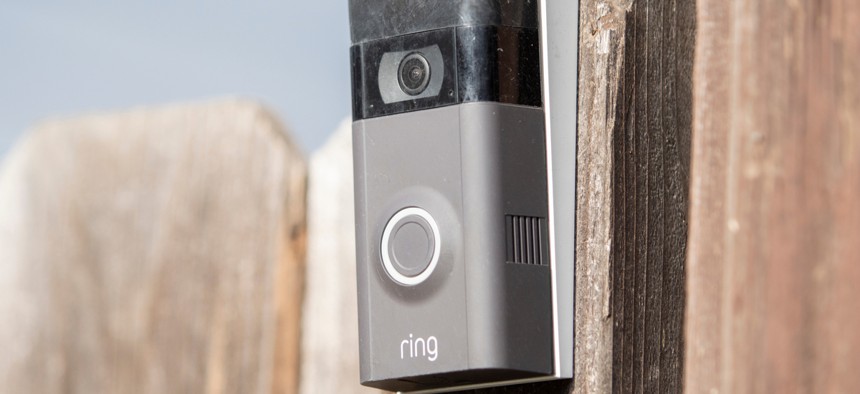Calls Grow for Amazon to End Ring Partnerships with Police Departments

Ring has entered into at least 29 new partnerships with police departments since George Floyd's death on May 25. Shutterstock
Footage captured on Ring, the video doorbell sold by Amazon, is available to over one thousand law enforcement agencies nationwide.
Ring, the “smart” video doorbell owned by Amazon, is no stranger to controversy. Since it began partnering with police departments in 2018, critics have decried Ring as helping create a “surveillance state” in cities where hundreds or thousands of Ring doorbell owners granted police permission to use the videos captured outside their front doors.
Now, as calls for defunding or dismantling the police have grown, Ring is once again under fire as activists demand that the company sever all ties with law enforcement agencies. Ring’s network of video cameras present fresh concerns about police using the technology to identify and track down protesters.
Ring has proliferated across the country in the past two years as the leading smart doorbell option, in part due to its partnership with 1,300 law enforcement agencies. Amazon has helped cities establish systems where municipalities subsidize Ring installation on private property and provides coaching to police departments on how to market Ring as a security product. Police have an incentive for Ring doorbells’ wide installation—the footage captured by the cameras expands what is available through CCTV or other public security cameras, and is available to them whether or not a homeowner agrees to provide the footage to police. Ring told Vice last year that they will only turn over the footage without owner participation if the government agency provides a “valid and binding legal demand.”
Ring has entered into at least 29 new partnerships with police departments since Minneapolis police officer Derek Chauvin killed George Floyd on May 25. Some activists are calling Amazon hypocritical for demanding for the end of “the inequitable and brutal treatment of Black people” in America while continuing to sell Ring technology. Many are pointing to a 2019 Motherboard report, which found that people of color were much more likely to be marked “suspicious” in Ring videos as proof that the technology puts Black people at risk.
Neither Amazon nor Ring returned a request for comment for this article.
At the federal level, at least two U.S. lawmakers have chastened Ring for their partnerships with police departments. “It’s time to cut ties between Amazon’s Ring doorbell camera and police departments across the country,” said U.S. Sen Ed Markley from Massachusetts. “We do not need a surveillance state, we cannot have a police state, and we must not allow these privacy and civil liberty violations to continue.”
The lawmakers have been joined by a number of civil and privacy rights organizations. The Electronic Frontier Foundation, a digital civil liberties organization, has long complained about the privacy threats that Ring doorbells pose and the lack of transparency around Amazon partnerships with police departments. Now, the group is worried that police will use videos captured by doorbells to track down protesters.
“Ring continuing to grow partnerships with police departments during the current protests make an arrangement already at risk of enabling racial profiling even more troubling and dangerous,” the group said in a statement. “These partnerships allow police … to make batch-requests for footage via email to every resident with a camera within an area of interest to police—potentially giving police a one-step process for requesting footage of protests to identify protesters.”
Civil liberties groups seem particularly concerned about how facial recognition software will interact with Ring footage. (Amazon recently announced that the company would stop selling its facial recognition software to police departments for one year.) Researchers have tested the software numerous times and say that, even after updates, it still contains gender and racial biases, and has particular trouble identifying and distinguishing dark-skinned Black faces. Amazon has denied claims of bias.
Over 30 civil rights groups penned an open letter to local, state, and federal officials in October 2019, calling for an investigation into Ring’s business practices, which they said “threaten civil liberties, privacy and civil rights, and exist without oversight or accountability.” They also called on “mayors and city councils to require police departments to cancel any and all existing Amazon Ring partnerships.”
The civil liberties groups have renewed this call now and stepped up pressure on Amazon to voluntarily discontinue its partnerships with police departments as they have with the sales of their facial recognition technology. "In light of Amazon's recent statement condemning police violence, we demand that you follow through on your sentiments and end Ring's troubling and dangerous partnerships with law enforcement," the Electronic Frontier Foundation said. "These partnerships put community members and the general public at risk of racial profiling, overpolicing, and the potential for violence."
Emma Coleman is the assistant editor for Route Fifty.
NEXT STORY: California Lawmakers Block Health Care Cuts






